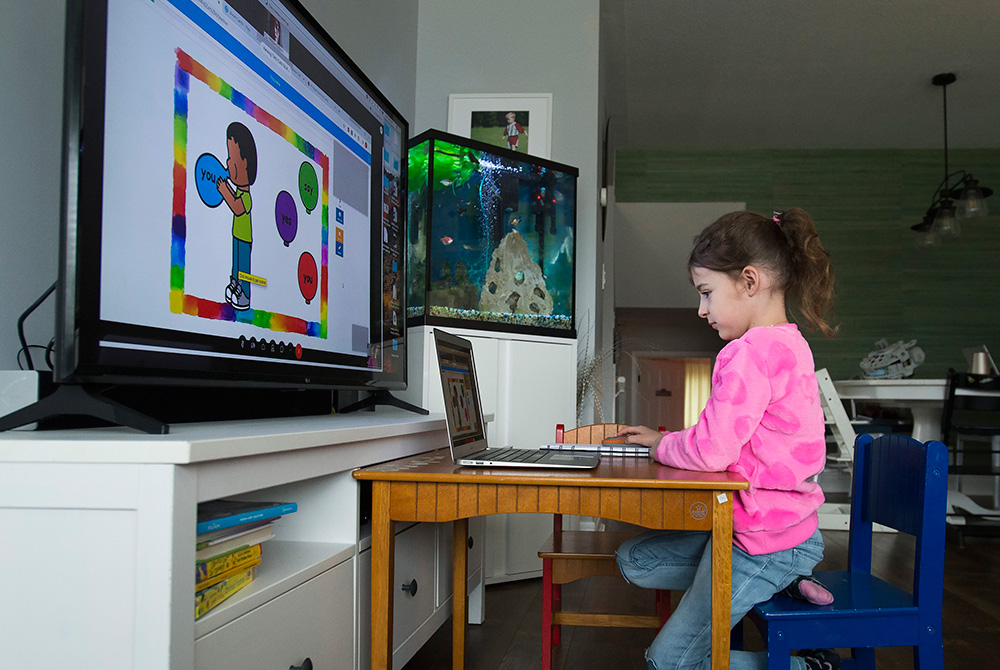I am emphatically and unequivocally not a homeschooler. This is what the pandemic has shown me.
In fact, the vast majority of us aren’t, either because it’s not in our DNA or because we are working parents. I’m a medical doctor and a writer, but now I have also assumed the role of a homeschooler. I don’t begrudge having more time with my children, but no one is more devoted to my children’s education than me, and in the context of remote learning I’m mediocre at best.
I have three children ages 9, 11 and 14, all of whom are strong students, but at different stages in their learning. One would think that remote learning would be a walk in the park for us, but the pandemic has made it abundantly clear that remote learning just isn’t all that.
First, technology can never replace real classroom learning. I see teachers trying their best to teach through Zoom or Google Meet, and my children are doing their best to learn this way. But this approach is far from, and will never be, ideal. Luckily, the scheduled hour-long videoconferences for each of my three kids are staggered, so they’re able to use the laptop or computer when necessary. If there were time conflicts, one of my children would lose out.
I can’t imagine how difficult it is for families with more financial constraints to have the necessary technology to provide their kids with the basic fundamental right to a good education.
Even when we have the tech, it doesn’t always work. So many times, I’ve scrambled to get the internet working again. The inconsistent connection means we miss parts of lessons. And when it does work smoothly, there are so many distractions around the home. My 14-year-old, for example, chooses not to turn on her camera, and I have caught her repeatedly texting, drawing or doing other things while the lessons are being taught. Knowing her, I know she is more focused in the classroom and wouldn’t dare do other things in her teachers’ presence. And don’t even get me started on how assignments are submitted and assessed online.
It isn’t quite right for kids to be sitting alone in their bedrooms staring at two-dimensional images of their teachers and friends, day in and day out. The remote learning is just that: distant and impersonal. Humans are social creatures. Remote learning allows the more introverted, like my son, to stay muted during meetings so as not to participate in class discussions, unless forced. He, like some other kids, chooses not to turn on his camera, and so there’s no eye contact with the teachers and less probability of him being drawn out of his shell to connect with peers and engage in the learnings. Although my kids miss the social aspect of being with their friends in school, I think they rather enjoy the lack of accountability to their teachers.
This accountability is so crucial. I appreciate more than ever how the mere fact of needing to be at school by a certain time was a strong motivating force for my children. Some kids are more motivated and self-directed than others: my 11-year-old consistently wakes up early, feeds the cats, puts away the dishes and then gets her schoolwork in order in preparation for her videoconference. My teenage daughter, on the other hand, has taken full advantage of this pandemic and lingers in bed for as long as she can, despite my exasperated attempts to wake her, until the very absolute moment she has to sign into her morning meeting. I see clearly now how the structure, discipline and pressure of school is a driving force for students of varying motivation and work ethics. School does indeed give purpose to their young days and compels them to be more productive, to build character and live up to certain set goals and expectations.
My children meet with their respective teachers for a mere hour, sometimes two, a day. They have the rest of the day free to do their assigned schoolwork, pursue their passions, or just play. Believe me, they have lots and lots of time to play and pursue their passions.
I understand that under these sudden pandemic circumstances, the curriculum content is truncated for remote learning, but how much can students take away from a mere hour or two? Remote learning is just not conducive to a rich knowledge-based curriculum. We get through my nine-year-old’s spelling, reading and math assignments within an hour (since social studies and science were victims to the pandemic), and so I try to enrich the rest of their day with a little bit of French, history, geography, science, et cetera. Of course, how successful I am at getting them to dig into any of these other subjects fluctuates with the barometric pressure. They don’t listen to me, their mom, as they do with their teachers.
With the remaining extra time on hand, I’m inadvertently getting a taste of what constructivists or progressive education advocates talk about when they suggest dismantling our classrooms to embrace “real learning” in “real” settings outside the classroom.
True, going for a walk in the woods can inspire learning, but in all honesty I find this approach superficial. Having had an extensive university education that ranges from the sciences to anthropology and classical mythology, I accept the fact that I know very little about an infinite number of things. So while it’s true that a walk in the woods can inspire learning, a more complete and in-depth review and analysis of the ecosystem as taught by expert teachers can exponentially enhance the knowledge, experience and foster a greater appreciation of the woods to a level I could never personally attain for my child.
As for “real learning” centred around daily activities such as cooking, gardening and other chores; well, you can only learn a finite number of things, aside from work ethics, from daily routines. As with everything in life, having balance between the formal and informal (school during the day, home/extracurricular life in the evening) yields a more well-rounded education about life and the world around us. Students can take what they learn at school and apply it at home and to life, and vice versa. For kids who live in less affluent homes and neigbourhoods, with no financial means to travel abroad, no ways to get to a nearby wood, or money even to buy extra books, they would be at a true disadvantage. “Real learning” is really for privileged children with at least one full-time dedicated homeschooling parent.
My youngest is at a stage when the acquisition and mastery of fundamental knowledge and skills is critical, so much of my attention is on him. The thing with my son is that he says he understands and shows he understands a lesson, but half an hour or a day later he forgets. It is only through memory work and repeated practice through worksheets and quizzes that he gains mastery and understanding in particular subjects. He is noticeably happier and more confident when he does master them. Knowledge begets knowledge and empowers his critical thinking and creative skills. “Real learning” would fail to provide the necessary rigours to challenge my children to better themselves in these ways.
I know for children who require extra one-on-one attention, remote learning with a dedicated parent can certainly be beneficial. With three children, however, I have to carefully divide my time between them to ensure they’re all learning and using their time effectively. I can see why child-centric, minimally guided discovery approaches don’t work well for my kids, and I suspect for many other children as well. If left to their own devices to pursue their “passion,” all my children, even my most studious and artistic little ones, would gravitate towards a narrow set of activities which invariably include video games and YouTube videos. Because they are, after all, just kids. Most will try to get away with doing the bare minimum if given the opportunity, which this pandemic has presented.
Through it all, teachers have proven irreplaceable. Websites and videos are provided, but these online resources have yet to live up to their hype. The fact is my kids are not as motivated to learn online, in part because of their inclination to click on less-than-educational links. It may be even harder for children with learning disabilities. I can’t imagine how difficult it is for parents who are working and have less education trying to teach and guide their children through remote learning.
If anything, this pandemic has made me appreciate more than ever how important our classrooms are (for the majority of parents) in helping our children achieve their fullest potential. Those who argue otherwise fail to recognize and appreciate how millions of lives have been lifted out of poverty because of a good education through our schools.
It took a pandemic to show that remote learning, though appropriate in some small settings, is, on a large scale, a poor substitute for learning in the classroom.
School provides opportunities to underprivileged children that they would not otherwise have. Good schools equip all children with broad-based and in-depth knowledge and skills they would not otherwise learn at home or in life. Without a strong education system, weak students get weaker, knowledge and skill gaps widen, and disparity grows between economic classes. This is a social injustice.
I am certain there is a subset of amazing homeschooling parents and children who thrive on remote learning, but when schools open again in the fall there will be a rush back to the classrooms because remote learning has, for many, been a failure of pandemic proportions. ![]()
Read more: Education, Coronavirus
















Tyee Commenting Guidelines
Comments that violate guidelines risk being deleted, and violations may result in a temporary or permanent user ban. Maintain the spirit of good conversation to stay in the discussion.
*Please note The Tyee is not a forum for spreading misinformation about COVID-19, denying its existence or minimizing its risk to public health.
Do:
Do not: